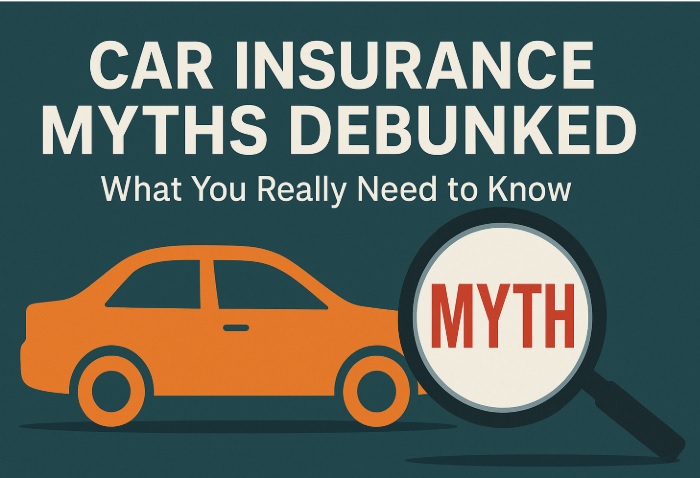Car Insurance Myths
It’s important to understand what’s true and what’s not to get the most out of your auto insurance policy. Misconceptions about car insurance are common—and can even cost you money. This article breaks down the most widespread car insurance myths and explains the truth behind them.
Myths About Insurance Rates
You’ve probably heard friends or family talk about what affects car insurance rates, but not everything they say is accurate. Let’s clarify a few common myths:
- Myth: Buying a new car always costs more to insure.
Truth: Not necessarily. While new cars may be more valuable, many come with safety features and lower risk ratings that can reduce premiums.
- Myth: Your credit score doesn’t affect your car insurance rate.
Truth: In most states, insurers use credit-based insurance scores as a factor when setting rates.
- Myth: Filing a claim always raises your rates.
Truth: A single claim won’t always result in a higher premium, especially if you were not at fault. However, multiple claims may raise red flags for insurers.
- Myth: Letting your coverage lapse won’t impact your price.
Truth: Gaps in coverage can lead to higher rates when you purchase insurance again.
Car Insurance Myths About Cars
People often make assumptions about how your car’s appearance or features affect your insurance. Here are some examples:
- Myth: Red cars cost more to insure.
Truth: Color is not a factor in determining insurance rates. What matters is the vehicle’s make, model, engine size, and safety record.
- Myth: Dark-colored cars get into more accidents.
Truth: There’s no solid evidence that vehicle color affects accident rates in a way that impacts insurance costs.
- Myth: Modifying your car makes it uninsurable.
Truth: Modifications can raise premiums, but they don’t make your car uninsurable. Just make sure to notify your insurer about any custom parts.
- Myth: New cars are stolen more often.
Truth: In reality, older vehicles are more frequently targeted because they lack advanced anti-theft technology.
Car Insurance Myths About Coverage
Insurance coverage can be confusing, especially with terms like “comprehensive” and “full coverage” thrown around. Here’s what you should know:
- Myth: Full coverage means you’re protected from everything.
Truth: “Full coverage car insurance” is a general term that usually includes liability, collision, and comprehensive coverage, but it doesn’t cover every situation.
- Myth: It’s okay to just get uninsured/underinsured motorist coverage to save money.
Truth: This type of coverage is important, but doesn’t replace liability, collision, or comprehensive coverage.
- Myth: If your friend crashes your car, their insurance will pay.
Truth: Typically, car insurance follows the car, not the driver. Your policy would likely be the first to pay.
- Myth: Comprehensive insurance covers everything.
Truth: It covers non-collision events like theft, fire, or weather damage—but not collision damage or liability.
- Myth: Rental cars aren’t covered by your personal policy.
Truth: Many policies do cover rental vehicles, but it depends on the specifics of your coverage.
- Myth: If you have gap coverage and total your car, you’re always fully protected.
Truth: Gap insurance covers the difference between what you owe and what the car is worth—but only if you already have comprehensive or collision coverage.
- Myth: Commercial insurance is only for big companies.
Truth: If you use your vehicle for work—like deliveries or client meetings, you may need a commercial policy, even as a sole proprietor.
Myths About Drivers
Major life changes can impact your insurance needs. Don’t fall for these common misunderstandings:
- Myth: Your policy doesn’t need to change when you have kids.
Truth: Adding young drivers or changing vehicles may require updates to your coverage.
- Myth: Your rates always increase as you age.
Truth: While young drivers typically pay more, mature drivers often receive discounts, especially those over 50 with clean records.
- Myth: Owning a home doesn’t affect car insurance.
Truth: Many insurers offer discounts to homeowners, even if your auto and home policies aren’t bundled.
Final Tip
Understanding the truth about car insurance helps you make smarter choices and avoid costly mistakes. When in doubt, ask your insurance provider to explain your policy clearly, and compare multiple quotes to find the best fit for your needs.
Secured with SHA-256 Encryption

Secured with SHA-256 Encryption


Secured with SHA-256 Encryption

